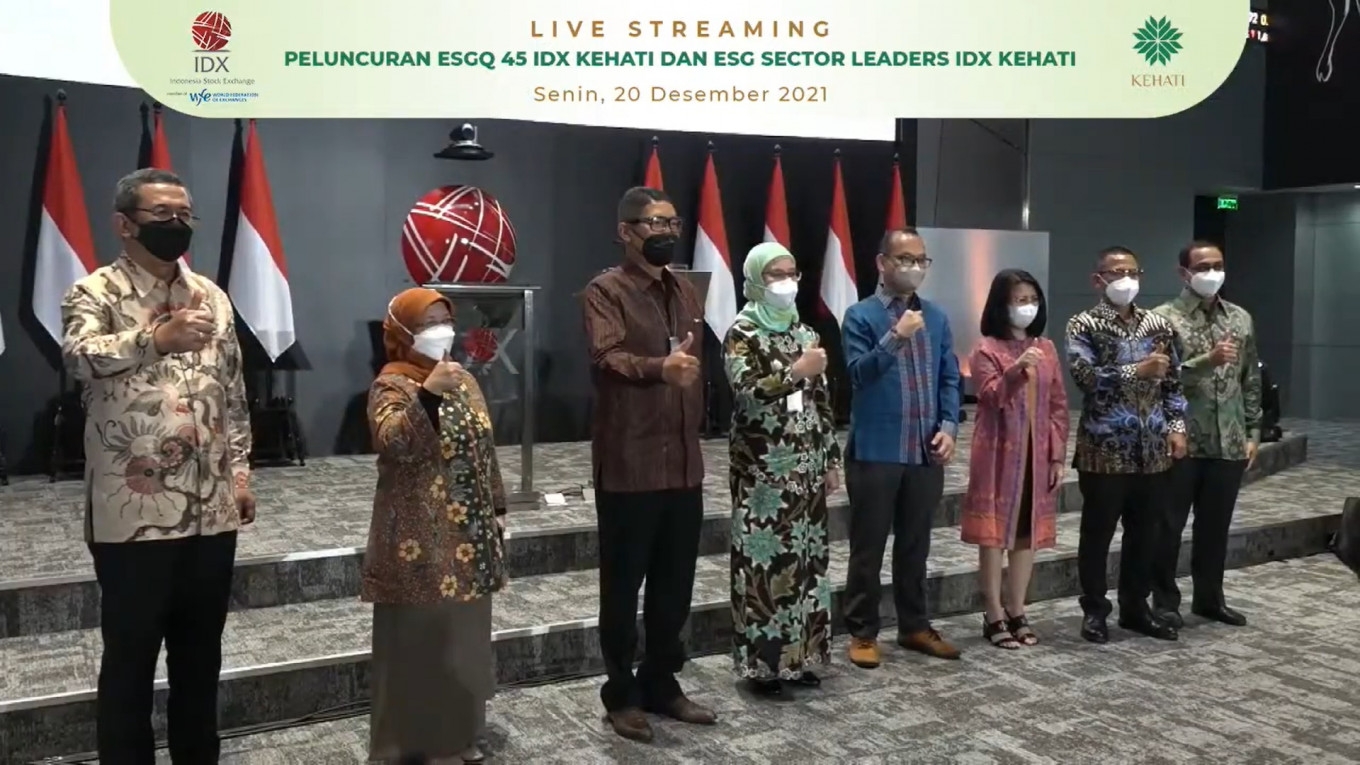Popular Reads
Top Results
Can't find what you're looking for?
View all search resultsPopular Reads
Top Results
Can't find what you're looking for?
View all search resultsOutsourcing data collection makes sustainability reports more credible, reliable
Companies such as ExxonMobil are facing hefty fines for filing misleading sustainability reports, even many years after the fact.
Change text size
Gift Premium Articles
to Anyone
 IDX president director Inarno Djajadi (third left) and Kehati Foundation executive director Riki Frindos (third right) during the launch of ESG Sector Leaders IDX KEHATI and ESG Quality 45 IDX KEHATI index at the Indonesia Stock Exchange (IDX) building on Dec. 20, 2021. (Indonesian Stock Exchange (IDX) YouTube channel/-)
IDX president director Inarno Djajadi (third left) and Kehati Foundation executive director Riki Frindos (third right) during the launch of ESG Sector Leaders IDX KEHATI and ESG Quality 45 IDX KEHATI index at the Indonesia Stock Exchange (IDX) building on Dec. 20, 2021. (Indonesian Stock Exchange (IDX) YouTube channel/-)
C
ompanies on the Indonesia Stock Exchange (IDX) are having to pay more than the usual lip service to the government’s requirements that they meet certain environmental, social and governance (ESG) criteria.
Following its regulations on sustainability, the Financial Services Authority (OJK) is finally getting serious about publicly listed companies needing to file proper ESG reports. Even so, the IDX projects that 54 percent of all listed companies will not submit an ESG/sustainability report for 2022.
That percentage is improving as more robust enforcement and reporting becomes the norm and as more companies realize if they are committed to ESG principles and practices, they will be viewed more favorably by stakeholders, investors, customers and employees. Increasingly, listed firms are looking to independent advisory specialists to start the data-collection process that begins the leadup to filing a sustainability report.
It is illegal to knowingly file a misleading sustainability report to any authority, just as with financial reporting or any other regulatory report. On large international exchanges, companies such as ExxonMobil are facing hefty fines for filing misleading sustainability reports, even many years after the fact.
Although required, the reason many Indonesian listed companies may not have filed an ESG/sustainability report is that it’s complicated. A proper ESG/sustainability report should truthfully reveal a company’s economic, environmental and social impacts caused by its everyday activities. It should also show the company’s or organization's overall strategies, policies and initiatives related to how they manage their economic, environmental and social impacts.
As most companies do not have the expertise to conduct such an evaluation internally, it makes more sense and is more cost-effective to outsource the process. This starts with data collection, which is the first part of ESG or sustainability reporting and typically involves the following steps:
First, defining the scope: The first step is to define the scope of reporting, which involves identifying the areas of ESG performance that are relevant to the company and its stakeholders. This may include environmental impact, labor practices, supply chain management, community involvement and governance among others.
Second, setting performance indicators: Once the scope is defined, the company must identify the specific ESG performance indicators it will use to measure its performance. For example, an environmental indicator might be the greenhouse gases emitted per unit of production, while a social indicator might be the number of workplace injuries.
Third, gathering data: The next step is to collect the data necessary to measure performance against these indicators. This may involve gathering data from internal sources, such as financial and operational systems, as well as external sources, such as suppliers, customers and regulatory bodies.
Fourth, analyzing the data: Once the data is collected, it must be analyzed to determine the company's performance against the established indicators. This may involve comparing performance over time, benchmarking against industry standards or comparing performance to the company's own goals.
Fifth, reporting the results: Finally, the company must report the results of its ESG performance measurement to its stakeholders. This may involve creating an annual sustainability report, as well as providing ongoing updates via other channels, such as the company website or social media.
Although there is currently not any requirement to do so, most companies then choose to have their reports assured by a recognized independent auditor that can bring expertise and objectivity to the process and provide an additional level of trust.
Overall, the process of data collection for corporate ESG/sustainability reporting is best done by outsourcing to an independent advisory firm. Having an expert adviser involved in the impact assessment, system development, data collection and report writing will assist in a smoother independent assurance process.
Outsourcing also improves general efficiency as it allows a company to focus on its core operations while the hired firm conducts its data collection. A qualified full-time internal ESG data collector is expensive. Outsourcing the collection process is a cost-effective alternative, as the company only pays for the service when needed.
Because the process is so convoluted and broad, outsourcing an experienced data-collection advisory firm in preparation for an ESG assurance and subsequent public report can help Indonesian companies save time and money, while efficiently improving their ESG performance, risk management and reputation.
Independent data collection and ESG assurance also better meets the increasing scrutiny of the Indonesian government as it ramps up its ESG vigilance for all the world to see.
***
The writer is managing partner, outsourcing services, Moores Rowland Indonesia.










